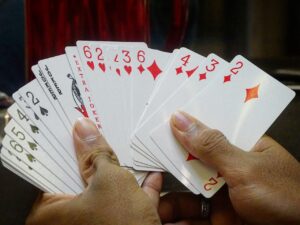
Are you looking for a fun and action-packed game for your next poker night? Look no further than Anaconda Poker, a unique variation that will keep you on your toes. With players passing cards and attempting to build the best hand, Anaconda adds intrigue and banter to the game. Here are the rules, strategies, and tips you need to know to play Anaconda Poker:
The Pack:
Anaconda Poker is played with a standard deck of 52 cards.
Game Type:
Anaconda Poker can be played as a high/low split game.
Players:
Anaconda Poker can be played with three to seven players.
Object of the Game:
The objective of the game is to create the best possible five-card poker hand.
The Deal:
Players are dealt seven cards, and they must pass three of their cards to their left or right, depending on the round. The passing player in the first round may be skipped in favor of player two to the left or right. After the passing rounds, players discard two cards and arrange the remaining five in any order.
The Play:
After the cards have been arranged, each player reveals one of their cards face-up. Then, there is a round of betting, followed by another card reveal and betting round. This process continues until all cards have been revealed. The best five-card hand wins the pot.
Poker Hands:
Anaconda Poker follows standard poker hand rankings, with the exception that a Full House is the best hand.
Strategy Points to Ponder:
- With the passing/drawing component, stronger hands are created, so it’s important to be willing to fold.
- Two of a kind has a higher chance of becoming a Full House, the best hand in the game.
- Straight and flush draws are likely to succeed due to the extra cards.
- Knowing the tendencies of the player passing you cards can be helpful in deciding which cards to keep.
- Remembering the cards you’ve already passed is important for predicting future passes and advantageous draws.
- Always assess the strength of your hand and other players’ hands during the betting and card-flipping phases.
- Be willing to release a hand if you know you’ve been beaten, and watch out for potential high hands in high-low games.

